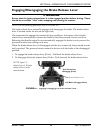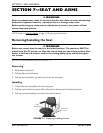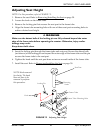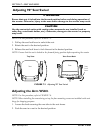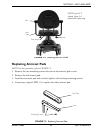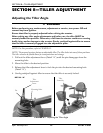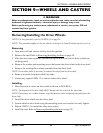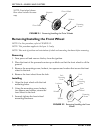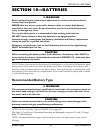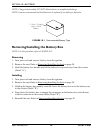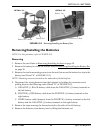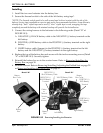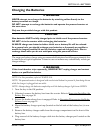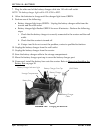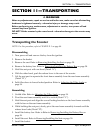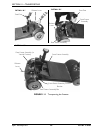
SECTION 10—BATTERIES
Part No. 1143205 37 Lynx™L-3 & Lynx L-4
SECTION 10—BATTERIES
ƽ WARNING
Before performing any maintenance adjustment or service, turn power off and
remove key from ignition.
NEVER allow any of your tools and/or battery cables to contact both battery
terminals at the same time. An electrical short may occur and serious personal
injury or damage may occur.
The use of rubber gloves is recommended when working with batteries.
DO NOT tip the batteries. Keep the batteries in an upright position.
Invacare strongly recommends that battery installation and battery replacement
always be done by a qualified technician.
All battery terminals caps (two on the left battery and two on the right battery)
MUST be installed prior to use.
CAUTION
When connecting the battery cables to the batteries, the battery cables MUST be
connected to the battery terminals/posts as shown in FIGURE 10.3 - otherwise dam-
age to the battery may result.
NOTE: If there is battery acid in the bottom of the battery box or on the sides of the batteries, apply
baking soda to these areas to neutralize the battery acid. Before reinstalling the existing or new
batteries, clean the baking soda from the battery tray or batteries being sure to avoid contact with
skin and eyes. Determine source of contamination. Never install/reinstall a battery with a cracked
or otherwise damaged case.
Recommended Battery Type
ƽ WARNING
The warranty and performance specifications contained in this manual are based on
the use of deep cycle gel cell batteries. Invacare strongly recommends their use as
the power source for this unit.
CAUTION
Failure to use the correct battery size and/or voltage may cause damage to the
powered scooter and give unsatisfactory performance.
NOTE: For this procedure, refer to FIGURE 10.1 on page 38.
The Lynx L-3 and Lynx L-4 powered scooters are designed to use two 12 volt, 12-Amp-
hour (12 AH) batteries.
NOTE: Recommended battery type is spill proof and requires no maintenance except routine
charging.



